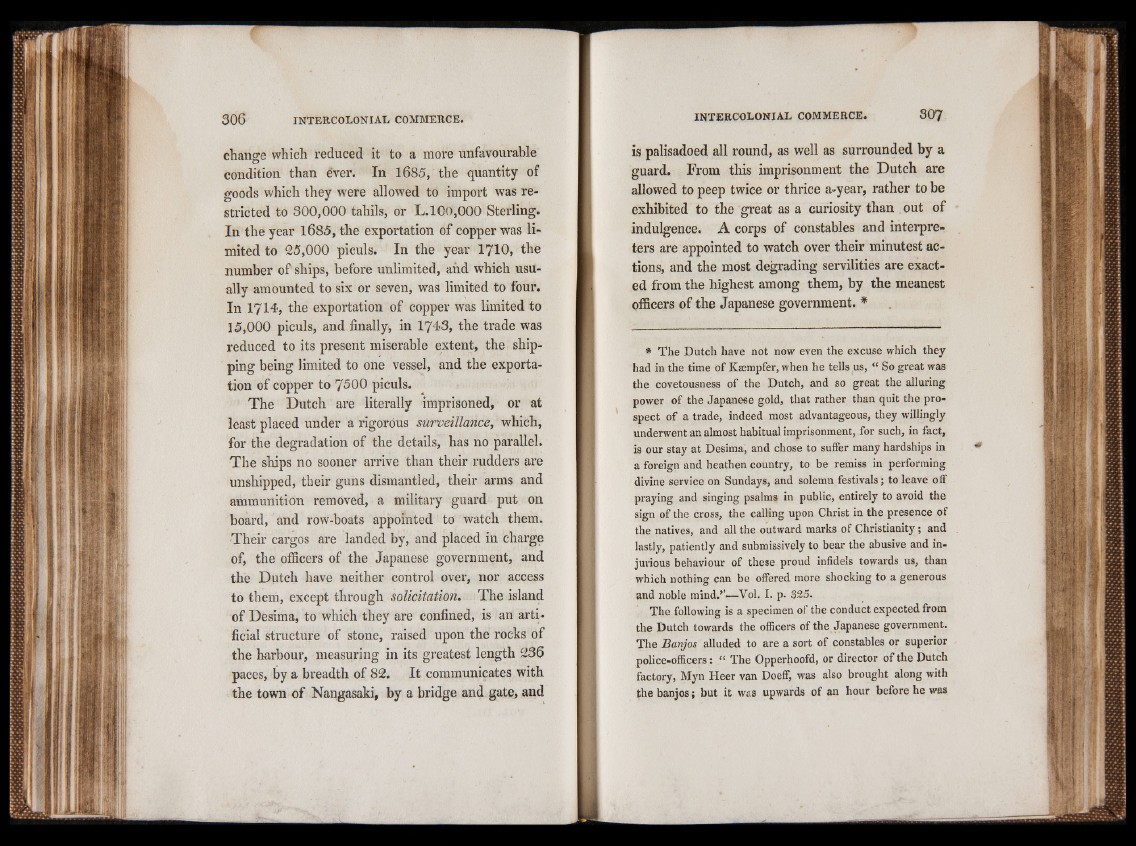
change which © reduced it to a more unfavourable condition than ever. In 1685, the quantity of
goods which they were allowed to import was restricted
to 300,000 tahils, or L.100,000 Sterling.
In the year 1685, the exportation of copper was limited
to 25,000 piculs. In the year 1 710, the
number of ships, before unlimited, and which usually
amounted to six or seven, was limited to four.
In 1714i, the exportation of copper was limited to
15,000 piculs, and finally, in 1743, the trade was
reduced to its present miserable extent, the shipping
being limited to one vessel, and the exportation
of copper to 7 500 piculs.
The Dutch are literally imprisoned, or at
least placed under a rigorous surveillance, which,
for the degradation of the details, has no parallel.
The ships no sooner arrive than their rudders are
unshipped, their guns dismantled, their arms and
ammunition removed, a military guard put on
board, and row-boats appointed to watch them.
Their cargos are landed by, and placed in charge
of, the officers of the Japanese government, and
the Dutch have neither control over, nor access
to them, except through solicitation. The island
of Desima, to which they are confined, is an artificial
structure of stone, raised upon the rocks of
the harbour, measuring in its greatest length 236
paces, by a breadth of 82. It communicates with
the town of Nangasaki, by a bridge and gate, and
is palisadoed all round, as well as surrounded by a
guard. From this imprisonment the Dutch are
allowed to peep twice or thrice a-year, rather to be
exhibited to the great as a curiosity than out of
indulgence. A corps of constables and interpreters
are appointed to watch over their minutest actions,
and the most degrading servilities are exacted
from the highest among them, by the meanest
officers of the Japanese government. *
* The Dutch have not now even the excuse which they
had in the time of Ksempfer, when he tells us, “ So great was
the covetousness of the Dutch, and so great the alluring
power of the Japanese gold, that rather than quit the prospect
of a trade, indeed most advantageous, they willingly
underwent an almost habitual imprisonment, for such, in fact,
is our stay at Desima, and chose to suffer many hardships in
a foreign and heathen country, to be remiss in performing
divine service on Sundays, and solemn festivals; to leave off
praying and singing psalms in public, entirely to avoid the
sign of the cross, the calling upon Christ in the presence of
the natives, and all the outward marks of Christianity, and
lastly, patiently and submissively to bear the abusive and injurious
behaviour of these proud infidels towards us, than
which nothing can be offered more shocking to a generous
and noble mind.’’—Vol. I. p. 325.
The following is a specimen of the conduct expected from
the Dutch towards the officers of the Japanese government.
The Banjos alluded to are a sort of constables or superior
police-officers: “ The Opperhoofd, or director of the Dutch
factory, Myn Heer van Doeff, was also brought along with
the banjos; but it was upwards of an hour before he was